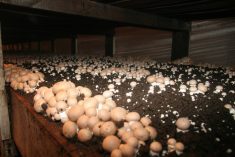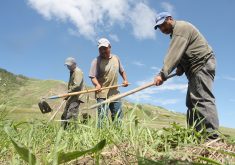About three million Canadians lost their jobs last spring as COVID-19 forced thousands of businesses to shut their doors or lay off staff.
Many farmers needed employees last spring and summer, but few Canadians applied for farm jobs, despite record levels of unemployment across the country.
A survey of farm operators has found that 41 percent of producers could not recruit a sufficient number of workers in 2020.
And more significantly, fewer Canadians were interested in available farm jobs compared to previous years.
“Seventy-one percent of employers (farmers) who reported labour shortages cited fewer Canadian applicants,” the Canadian Agricultural Human Resource Council (CAHRC) said in a report released this morning.
Read Also

Huge Black Sea flax crop to provide stiff competition
Russia and Kazakhstan harvested huge flax crops and will be providing stiff competition in China and the EU.
The report, Understanding the Effects of COVID-19 on Canada’s Agriculture Workforce, was based on a survey done last fall and this winter of 450 farm businesses and detailed interviews with 20 farmers.
CAHRC hired the Conference Board of Canada to conduct the research.
The survey found that Canadian farmers lost out on earnings worth $2.9 billion because of labour shortages connected to COVID-19.
The $2.9 billion represents 4.2 percent of total agricultural sales in 2020.
In terms of labour shortages, the CAHRC report said:
• Two in five employers (farmers) experienced labour shortages during COVID-19.
• Most employers (86 percent) who reported labour shortages believe that COVID-19 contributed to their shortages.
Of all the crops and commodities produced on Canadian farms, COVID had the biggest impact on fruit and vegetable growers and beekeepers.
About 55 percent of farmers in horticulture said they couldn’t find enough workers. About half of beekeepers (47 percent) couldn’t hire enough employees, according to the survey.
Both sectors are highly dependent on temporary foreign workers. On many of Western Canada’s apiaries, about half (or more) of the employees are from the Philippines, Mexico and Central America. Thousands of temporary foreign workers weren’t permitted into Canada last year, or their arrival was delayed, because of COVID-19 protocols.
“Roughly two-thirds of employers who reported TFW vacancies because of COVID-19 cited that travel restrictions imposed by Canada or the home countries of TFWs prevented them from bringing in (workers),” the report said. “Other travel restrictions mentioned by farm operators include limited or cancelled flights.”
The difficulties of getting temporary foreign workers to Canada, why they’re critical for the country’s age sector and workers becoming infected with COVID-19 on Canadian farms became a major political and media issue last spring.
Less discussed was that Canadians aren’t willing to do physical work on farms — even when they’re unemployed and jobs are available.
Farmers told the Conference Board of Canada that many Canadian applicants were seeking part-time work.
“This could be related to applicants wanting to maintain low enough working hours to qualify for CERB (a $500 a week program for workers affected by COVID-19),” farmers told the Conference Board.
A vegetable grower from Quebec summarized the frustrations of many farmers.
“We have received 80 names…. Of those 80 people, 25 showed up and stayed for more than 24 hours. All of the others basically did not want to work … did not want to work more than 19 hours (so that they could keep their CERB). They did not want to work early in the morning or late at night, and they did not want to work on weekends.” said Anne Vern in the CAHRC report.
Approximately half of the 450 producers in the survey said they want help in finding and retaining Canadian workers.
Contact robert.arnason@producer.com


















